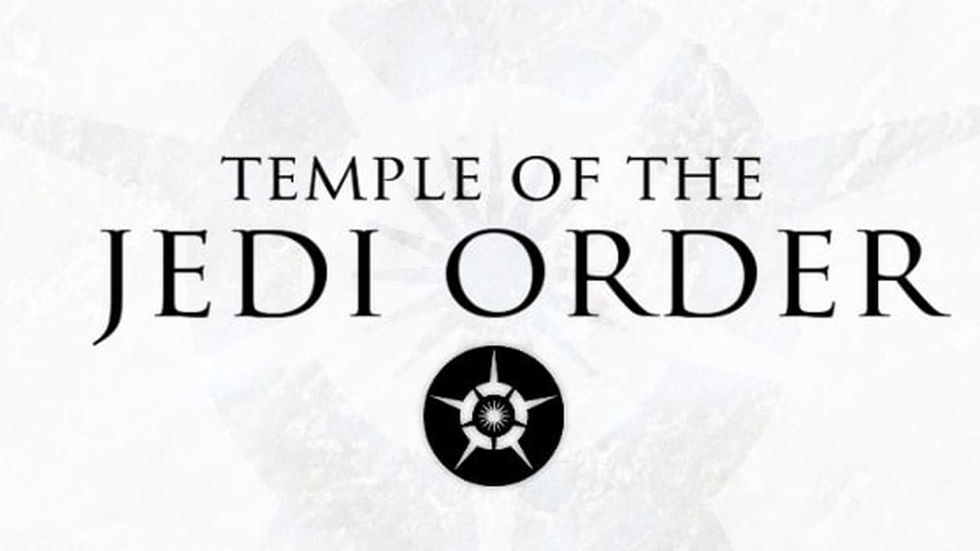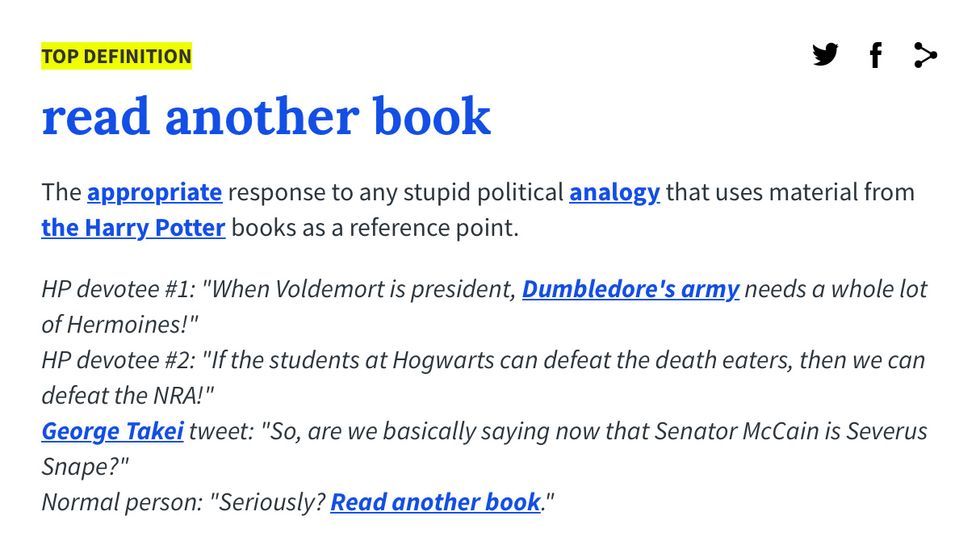
University teams play quidditch, the game of Harry Potter books fame
Photo by Sergei Bachlakov (Shutterstock)
In January 2019, President Trump’s ban on transgender people serving in the military was approved by the Supreme Court, which meant the worst had happened: Albus Dumbledore would be ashamed of us.
It gets worse. In England, Europe’s fourth most LGBTQ-friendly nation, there are 175,000 self-professed Jedis who are appalled at America’s anti-trans legislation. As “instruments of peace,” Jedis believe “in a society that does not discriminate on the basis of sexual orientation or circumstances of birth such as gender, ethnicity, and national origin.”
 Temple of the Jedi Order
Temple of the Jedi Order
If you’re not moved to action by framing today’s socio-political turmoil in terms of fictional characters, then you are not a true Jedi or diehard Potterhead. You may just be a fan of the franchises, which is not what fandom is about anymore. Nowadays, these active communities create full-on belief systems, leading the most dedicated fans to see the real world through the lens of their favorite franchise. When fandoms replace religion, fan communities develop their own ethos, codes of behavior, and a network of peer-mentoring that turns art appreciation into worship.
According to census surveys from England, Australia, and the Czech Republic, over 250,000 Jedis currently roam the earth, which is definitively too many followers for a brand of fictionalized metaphysics solely designed to earn Lucasfilm $4 billion. But the Temple of the Jedi Order (a.k.a the Church of Jediism) touts on its website, “Jediism is not based in fiction, but we accept myth as a sometimes more practical means of conveying philosophies applicable to real life.”
John Henry Phelan is a Jedi through the Temple of the Jedi Order, which means he helps run the most trafficked website on Jediism in the U.S. He told Details magazine in 2013, “I think we’re heading to a point where we’re going to see a physical Jedi temple sometime in the next 10 years…probably something like a monastery, where Jedi monks will live and where other Jedi can visit. I’d be surprised if that didn’t happen.” To date, it sadly hasn’t (but there are a good four years left for this runaway train called reality to fly completely off the tracks, resulting in a Jedi monastery next to your local mosque and synagogue).
To be fair, the distinctions between a fandom and a religion are surprisingly blurry as far as sociologists are concerned. With social media building bridges between like-minded individuals, fandoms aren’t just online subcultures; they’re “participatory cultures.” If we’re looking at patterns of human behavior, so are religions. Henry Jenkins, Professor of Communications at University of Southern California and professional super nerd, breaks down the facets of participatory culture:
1. Relatively low barriers to artistic expression and civic engagement.
2. Strong support for creating and sharing one’s creations with others.
3. Some type of informal mentorship in which the most experienced members pass along their knowledge to novices.
4. Members who believe their contributions matter.
5. Members who feel some degree of social connection with one another and care about other members’ opinions about their contributions.
Among Jediism’s official 16 teachings and 21 maxims is a dedication to civic engagement (“each Jedi improves the world with each deed they perform”) and support of their community (“have faith in your Jedi brothers and sisters” and “defend the way of Jediism”). When the Pacific Standard‘s Ben Rowen interviewed self-professed Jedis, he acknowledged the easy ridicule of the “faith” but sought to understand its appeal: “Beneath the surface—once the lightsabers are stowed away in their protective cases and the business of spiritual belief begins—Jediism is quite paradigmatic of trends in modern religious practice. Jedis have a strong argument that their fictional, pop-culture-inspired canon, with its aliens and futuristic technology, has given rise to a religion worthy of recognition here in reality.”
Of course, the Jedi order is not the first or even the loudest fandom community waving its flag on the Internet (no one’s ranking fandoms here; please don’t @ us). In 1997, J.K. Rowling published Harry Potter and the Philosopher’s Stone and proceeded to print herself $650 million over the next 20 years. Global readers of all ages have turned the Potter fandom into a life philosophy originally dictated by an elderly homosexual wizard who mentored an orphan boy by giving him cryptic advice that read like slam poetry.
At its worst, well-meaning Potterheads discuss the most fraught and divisive issues of our time in terms of Harry Potter references in an attempt to enlighten others. Aside from presupposing that the Harry Potter series is an unproblematic, universal touchstone (which it definitely isn’t), doing this is annoying. So much so that the phrase “read another book” has entered online lexicon as shorthand for, “Please take the Harry Potter series 75% less seriously than you currently do.”
 UrbanDictionary
UrbanDictionary
For example, some inappropriate uses of Harry Potter references include: protesting those who refuse to recognize the legitimacy of the LGBTQ community by comparing it to the imaginary community of muggles…
…leading the fight for gun control with illiteracy…
…and incisive political commentary on the persecution of journalists.
As Patton Oswalt points out, books featuring elaborate fantasy worlds are excellent for escapism and even light-handed allegories, but they’re not conducive to interpreting world politics: “It’s a cool book with some wonderful passages but it also has ghost sex & giants & super babies & demons. It’s why we don’t make laws based on Game of Thrones, My Little Pony or Legend of Zelda.”
So why are some treating fandom like a faith? One twentieth-century sociologist whose knowledge about people was as voluminous as his facial hair was Émile Durkheim. He defined religion as “a unified system of beliefs and practices relative to sacred things, that is to say, things set apart and forbidden–beliefs and practices which unite into one single moral community called a Church, all those who adhere to them.”
In the same way, sacred objects are the pillars of fandom. In Star Wars, the lightsabers and hooded robes are just symbols of the civic duty, compassion, and self-awareness promoted by Jedi creed (which, to its credit, is said to be adapted from the actual Prayer of St. Francis of Assisi). Harry Potter merchandise is rife with the Deathly Hallow symbols and the house crests of Hogwarts because they represent the hero’s journey – with the poignant twist that unassuming heroes are everywhere (Hufflepuffs are just as strong as Gryffindors, we get it).
Is there danger in conflating fandoms with religion? To society as a whole, no – aside from causing mass annoyance on Twitter, consumers aren’t generally at risk from neurotic people taking fandoms too seriously. In fact, as far as public sentiment goes, the people who pose the most danger are those who don’t believe in anything.
In Casey Cep’s article in the New Yorker, “Why Are Americans Still Uncomfortable with Atheism,” she recounts how identifying as “faithless” has been a source of social shame throughout history and still remains so, to some degree, today. So much so that the stigma against atheists can overshadow stigmas against other religious beliefs. According to 2018 surveys, “Americans, in large numbers, still do not want atheists teaching their children, or marrying them.” She continues, “They would…prefer a female, gay, Mormon, or Muslim President to having an atheist in the White House, and some of them do not object to attempts to keep nonbelievers from holding other offices, even when the office is that of notary public.”
Cep adds, “Such is the slippery label of ‘atheist’ in the American context: slapped on those who explicitly reject it, eschewed by unbelievers who wish to avoid its stigma. Both atheists and their critics often make a hopeless muddle of the category, sometimes because it is genuinely complicated to assess belief, but often for other reasons.”
In Britain (where Jediism was the seventh-largest religion in 2015), “atheism” was on the decline in 2018. However, the number of self-reported Christians hasn’t risen; rather, more people are reporting that they believe in “some sort of spiritual greater power.” In fact, according to a 2017 poll by WIN/Gallup International, the U.K., and the Czech Republic (with 15,000 self-identified Jedis) are among the ten least religious countries. As Cep describes, Americans’ reluctance to identify as “atheist” has always resulted in dubious polls, but recent surveys note an upward trend in U.S. atheism overall.
And as psychologists like to remind us, “higher levels of religious belief and practice (known in social science as ‘religiosity’) is associated with better mental health.” But what it actually comes down to are the basic benefits of any “participatory culture,” be it religion or a fandom subculture, from Star Wars and Harry Potter to My Little Pony and Supernatural. The social benefits that Jenkins describes include the simple but crucial element of social validation: “Members who feel some degree of social connection with one another and care about other members’ opinions about their contributions.” But as Cep points out, “Atheism, however, is not a single identity, ideology, or set of practices.” It’s just nonbelief.
So according to the data collected by nerds who specialize in the random, chaotic patterns of human behavior, we’re living in increasingly faithless times. But when that outlook is still stigmatized–not to mention statistically correlated with higher rates of depression and anxiety–it almost seems natural to look for an alternative belief system. For some, that’s the Force. For others, it’s WWDD (“What Would Dumbledore Do?”). And because reality is so much odder than fiction, they’re both technically good for you.
POP⚡DUST | Read More…
Why Trump’s National Emergency Might Be a Good Thing
The Curse of Nickelodeon’s “All That” (The Reboot Is Doomed)
Is Pete Davidson “Ugly Hot” Enough to Be the Next Steve Buscemi?
- The Latest “Harry Potter” Book Ban Proves MAGIC IS REAL – Popdust ›
- Politicians As Harry Potter Characters – Popdust ›
- Welcome to Genderqueer TV: 5 Non-Binary Characters – Popdust ›
- Television vampire fandom and religion | Scripta Instituti Donneriani … ›
- Just How Much Is Sports Fandom Like Religion? – The Atlantic ›
- Popular culture fandoms, the boundaries of religious studies, and … ›
- When does fandom become religion? | Alan Wilson | Opinion | The … ›
- Popular culture fandoms, the boundaries of religious studies, and … ›
- Religion and the Pathologization of Fandom: Religion, Reason, and … ›
- Oh, My Pop Culture Religion: Fandom as Religion? | Lady Geek Girl … ›
- Comic-Con? How Fandoms — and Religions ›













